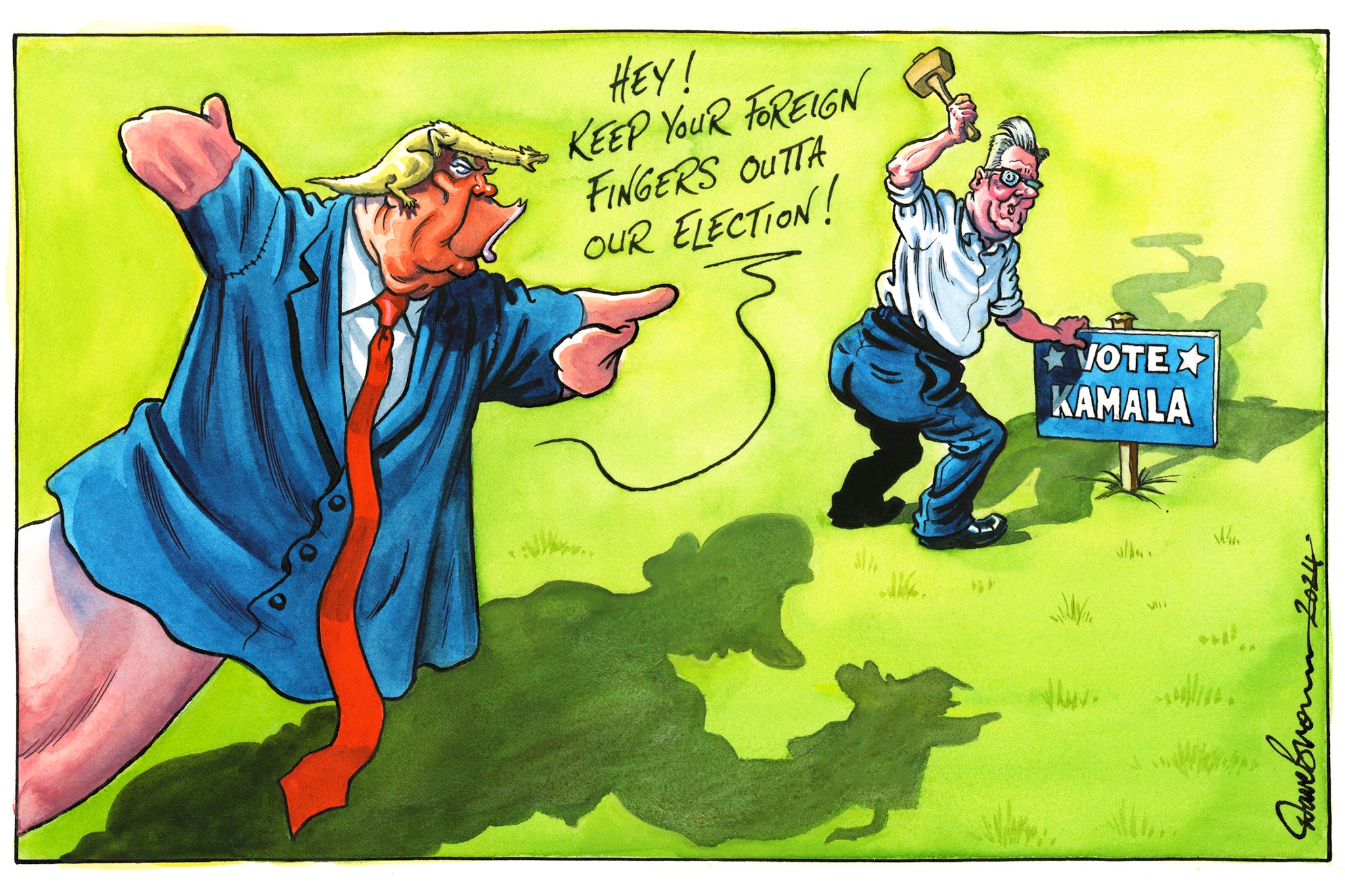Why Trump’s latest outburst should be seen for what it is – a phoney war against Labour
Editorial: Donald Trump’s accusation of ‘blatant foreign interference’ in the race for the White House, by card-carrying members of Starmer’s party, is mere electoral turbulence in the UK-US transatlantic alliance

Someone in former president Donald Trump’s campaign team – or possibly the candidate himself – seems to have seriously overreacted to a rather trivial incident.
A random LinkedIn post by a Labour Party official inviting fellow activists to fly to the US to work for the Harris-Walz campaign has provoked a complaint to the Federal Election Commission (FEC) – and some fairly lurid language.
The Trump campaign accuses Labour of “blatant foreign interference” in its election, as if one hundred or so well-meaning but frankly irrelevant Britons pushing leaflets through some doors in Pennsylvania was going to change the outcome of a presidential election involving some 155 million or so likely voters.
En passant, the Republicans acknowledge that this exercise is, practically speaking, a minor matter, and dismiss it as “another feeble attempt in a long line of anti-American election interference”. Even so, they are upset as a matter of principle, with the Trumpers even invoking the War of Independence in their plea to the FEC, remarking: “When representatives of the British government previously sought to go door-to-door in America, it did not end well for them.”
Everyone knows there is no substance to the accusations. Everyone also knows that Labour is more politically aligned to Kamala Harris’s campaign, but Mr Trump’s politics – like his supporter, Nigel Farage’s – are one of childish indignation; and should be treated as such.
Hours after Mr Trump accused Labour of electoral interference, his billionaire supporter Elon Musk was embroiled in a social media spat with the Centre for Countering Digital Hate (CCDH), an anti-racism campaign group started by Starmer’s chief of staff, Morgan McSweeney. Leaked documents said to have been drawn up by CCDH list “Kill Musk’s Twitter” as one of the group’s priorities.
Mr Musk made his feelings clear on X: “This is war.” It’s really not – but things are plainly out of hand.
Someone has forgotten that there is a very long tradition of collusion between the Labour Party and the Democrats, and Conservatives with Republicans, over all sorts of campaigning strategies and tactics, with the Americans usually introducing their counterparts to the most up-to-date research and techniques.
Relations grew especially close in the Reagan-Thatcher and Clinton-Blair eras, and no one much minded. It is not espionage. It is certainly not on the scale or malign intent of the various Russian, Chinese and Iranian attempts to create chaos and manipulate elections in the West and elsewhere (most recently in Moldova). It is a storm in a teacup, or else an awkward moment over coffee.
Sir Keir Starmer is right to make light of it, and put things into perspective: “Labour Party volunteers have gone over pretty much every election. They’re doing it in their spare time, they’re doing it as volunteers, they’re staying I think with other volunteers over there. That’s what they’ve done in previous elections, that’s what they’re doing in this election, and that’s really straightforward.”
The complaint, such as it is, should be disposed of quickly, and not just because it has only marginal merit, at best. The United States and the United Kingdom have far more important business to transact, whoever happens to occupy the White House and No 10 respectively.
If that does turn out to be Donald Trump dealing with Sir Keir, we know that both men have at least struck up a reasonable personal rapport, after what was, by all accounts, a highly convivial two-hour dinner with the Republican nominee in his native New York last month. Accompanied by David Lammy, to whom Mr Trump didn’t object, despite some disobliging remarks by the foreign secretary, the former president declared of the prime minister: “I actually think he’s very nice. He ran a great race, he did very well. It’s very early, he’s very popular.”
It seems there may be something in the Labour spin that Sir Keir is more engaging in private than he appears in public.
At any rate, the prime minister and the president face the same challenges in the world, and it is in both their nations’ interests to work together. Some common goals are uncontroversial, indeed bipartisan on both sides of the Atlantic. The rise of China has been, in part, answered by the Aukus alliance with Australia, and both countries have constructed a common diplomatic front against Chinese violations of human rights, spying activities, territorial expansionism and trading practices. Much the same goes for Iran and, notwithstanding Mr Trump’s past personal diplomacy, North Korea.
In other areas, agreement is less readily apparent on the means to shared ends – a just end to the Russian invasion of Ukraine, a long-term settlement in the Middle East, and protecting the future of the planet from climate change. There is also work to be done on making sure that Nato members all honour their financial commitments to the alliance, and, albeit more fancifully, striking a post-Brexit US-UK free trade deal.
The Trump-Starmer political marriage, should it indeed come to pass, will not be made in heaven; in outlook, background and temperament the two men have little in common. But, despite these recent mishaps, they will have to work together, and cherish an alliance that has done so much for the world.






Join our commenting forum
Join thought-provoking conversations, follow other Independent readers and see their replies
Comments